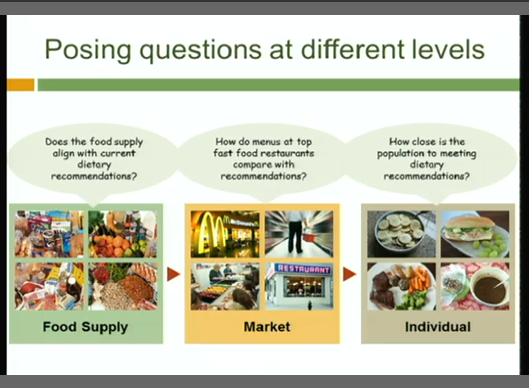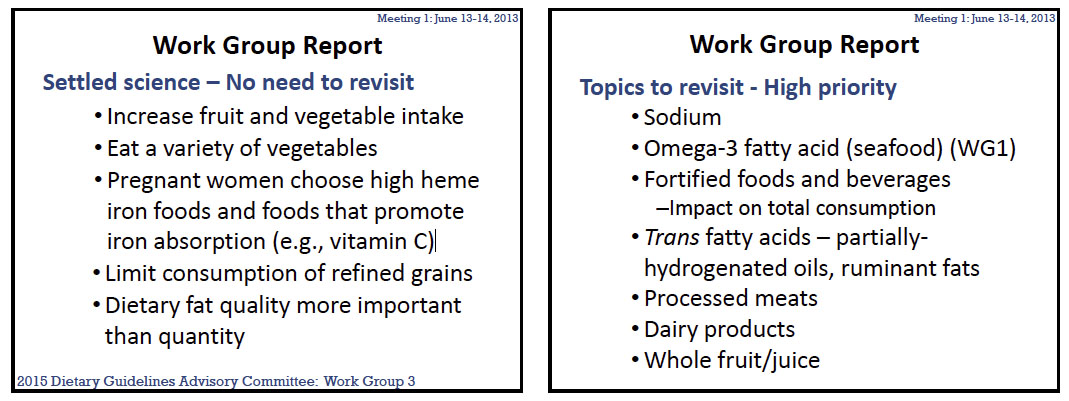Share This
Every five years the U.S. government comes out with new Dietary Guidelines for Americans. Leading up to the process, a Dietary Guidelines Advisory Committee (DGAC) of a dozen or so appointed nutrition experts labors for two years to review the latest nutrition studies and come up with recommendations for the new Guidelines.
“Ho-hum,” you’re saying to yourself. “Dietary Guidelines don’t really matter, since so few Americans follow any kind of healthy dietary advice anyway.” But in fact, because federal law requires all government nutrition programs, such as WIC and school lunches, to hew to the Guidelines, what’s in them is actually important.
So, like a fly on the wall, we listened in on the DGAC’s latest public meeting last week to get a sense of what might be included in the 2015 Dietary Guidelines, and here’s what we heard:
1) Emphasis on Plant-based Diets
Of 54 speakers during the public testimony portion, 13 spoke passionately about the evidence for moving to plant-based diets, with less (or even no) emphasis on meat and dairy. Check out our newly-updated Oldways Vegetarian / Vegan Diet Pyramid and our Oldways Vegetarian Network, with tools to support heightened interest in plant-based diets.
2) Importance of Sustainability
Hand in hand with the dietary emphasis on plants is an environmental one. The DGAC is, for the first time, talking about the importance of recommending foods that we can actually produce sustainably. They raised the question, for example, of looking at whether it’s sustainable to recommend 8-12 ounces of fish a week. This emphasis puts an even more solid spotlight on the vegetarian approach.
The committee invited Dr. Kate Clancy, a food systems consultant, to address them for an hour on sustainability / environmental issues. She said, “What pattern of eating best contributes to sustainability? The simple answer is plant-based diets.” She later made it clear that she thinks plant-based doesn’t necessarily mean “bereft of meat” — just using meat very sparingly.
3) Dietary Patterns at the Core of the Matter
Earlier Dietary Guidelines have put a big emphasis on nutrients, with pronouncements such as “Cut back on saturated fat, and get more calcium.” That’s silly. We don’t eat nutrients; we eat foods. And those foods interact with each other, based on our frequency and pairing of different foods – what’s known as the overall dietary pattern.
The DGAC stated repeatedly that dietary patterns will be at the core of their work; they said they are “very interested in patterns such as the Mediterranean Diet and DASH.” When they look in that direction, they’ll find Oldways, out in front of the parade once again. For more than 20 years, since we first introduced our original Mediterranean Diet Pyramid, we’ve been making the point that the real answer to health lies in overall dietary pattern rather than nutrients or isolated “superfoods.” (An Oldways hint for the DGAC – pyramids filled with appealing real foods are the best way to represent an overall dietary pattern.)
You can tell simply by the names of the working subcommittees of the 2015 DGAC that the emphasis is no longer on nutrients:
|
Sub-Committees for 2010 DGAC
1. Sodium, Potassium and Water
2. Nutrient Adequacy
3. Energy Balance and Weight
4. Carbohydrates and Protein
5. Ethanol
6. Fatty Acids
7. Food Safety & Technology
|
Sub-Committees for 2015 DGAC
1. Food and Nutrient Intakes and Health: Current Status and Trends
2. Dietary Patterns, Foods and Nutrients, and Health Outcomes
3. Diet and Physical Activity Behavior Change
4. Food and Physical Activity Environments
5. Food Sustainability and Safety
|
4) Cultural Sensitivity and Acculturation
Acculturation, another strong Oldways specialty, seems to be getting a high profile too. Subcommittee #3 will be focusing (among other topics) on the well-documented fact that immigrants’ health goes downhill as they abandon their traditional diets; chairperson Rafael Perez-Escamilla says “acculturation is of enormous importance to our country.” Oldways’ family of Health through Heritage programs helps people reclaim their heritage for better health.
Cultural sensitivity will be important for the DGAC to keep in mind too. During the public testimony, Milton Mills, an African American physician, advocated for removal of dairy from the Guidelines, citing the fact that most minorities are lactose intolerant (90% of Asian Americans, 74% of Native Americans, 70% of African Americans and 53% of Mexican Americans). That’s a perspective that Oldways understands and has included in our African Heritage Pyramid and our A Taste of African Heritage cooking curriculum.
5) Personal Responsibility and Societal Responsibility
The 2010 Guidelines, for the first time, talked about how it wasn’t enough for individuals to try to eat better; success would not be likely unless we address the entire environment that shapes our food and activity choices. The 2015 DGAC is taking that issue to the next step with a serious emphasis on the overall context of our food choices.
Subcommitte #3 will focus on the changes that individuals and small groups (families) can make on their own, including non-food issues such as family meals, eating more slowly, etc. Subcommittee #4 will focus on researching and recommending the changes society needs to make to support changes for better health. For instance – as illustrated by the graphic below from speaker Dr. Susan Krebs-Smith – how can we expect people to make half their grains whole until half the grain choices at fast food restaurants are whole?
6) Whole Grains / Refined Grains / Gluten
Speaking of grains, since the Whole Grains Council is one of Oldways’ leading programs, we also listened for anything that touched on grains and health. Last June in its first meeting the 2015 DGAC noted which topics they felt have “settled science” – and therefore don’t need to be re-examined now – and which do not. They listed five items on the “Settled Science – No Need to Revisit” side and seven on the “Topics to Revisit – High Priority” side:
One member of the committee referred to gluten as “the new cholesterol,” (presumably harking back to the years when “cholesterol free” appeared on apples, avocados, and other naturally cholesterol-free foods) and asked her colleagues to clarify the real evidence on gluten and health. We certainly applaud that idea; in fact, it will be a key focus on next November’s Whole Grains Council conference in Boston.
7) Other Bits and Pieces of Interest
A few other issues seems worthy of mention as we wrap this up. There seems to be some recognition that the sodium recommendations in the 2010 Dietary Guidelines – limiting sodium to 1500mg a day for most of us – were too stringent and may potentially be relaxed, based on a 2013 interagency report. Caffeine also seems to be a topic of interest to the DGAC, probably in response to problems with energy drinks. What are safe levels of caffeine? How much is too much? The committee also noted that some other countries have dropped cholesterol concerns from their guidelines, since cholesterol in food is only a minor contributor to cholesterol in our bodies; perhaps it’s time for us to follow suit based on updates in the science.
Keep in mind that the Dietary Guidelines Advisory Committee is exactly that: an advisory body. By early next year, they’ll create a report that they’ll submit to USDA and HHS (Health and Human Services) with their best science-based recommendations. Nips and tucks then get taken here and there, by the political process, and what comes out the other end is anyone’s guess. That said, the DGAC meetings give us the best possible early look at which way the wind might be blowing, in government nutrition policy – so we wanted to pass on the highlights to anyone else out there who might be interested.
- Cynthia



Comments
Add a Comment